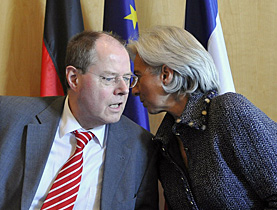Politicians vent anger over OECD and Germany

Switzerland's parliament has slammed the Organisation for Economic Co-operation and Development (OECD) for putting the country on a draft blacklist over its tax laws.
Senators on Tuesday also targeted Germany’s finance minister, Peer Steinbrück, in a row over banking secrecy and attacks on preferential tax policies.
Neither did the government escape strong criticism during a three-hour debate in the Senate. The debate followed the seven-member cabinet’s decision last week to ease banking secrecy for foreign clients and to adopt OECD rules in an effort to avoid potentially crippling sanctions.
Finance Minister Hans-Rudolf Merz dismissed allegations that the government was unprepared to counter the financial crisis.
He also rejected criticism that the cabinet was incapable of withstanding the pressure by the major powers on the privacy of bank clients and of defending the interests of Switzerland’s largest bank, UBS, in a legal row with authorities in the United States.
“The government has been active over the past year but the developments in the global financial sector took an unexpected turn,” said Merz. He added that Switzerland had “never intended to just sit out” the disagreement with the US.
Swiss authorities handed over the details of 250 clients of the UBS bank suspected of tax violations in the US.
Scathing criticism
During Tuesday’s debate, Senators from across the political spectrum said the government lacked a coherent policy.
“The cabinet has had more than ten years to prepare for these challenges, but it turned a blind eye,” said Simonetta Sommaruga of the centre-left Social Democratic Party.
She also pointed out that the government’s slow decisions were contradictory and damaged Switzerland’s reputation as a financial centre.
Maxmilian Reimann of the rightwing Swiss People’s Party said the government had been “asleep”, while his party colleague, Hans Germann, said he was not sure whether the government had opted for the right policy to stop the crisis.
Bruno Frick, senator of the centre-right Christian Democrats, was outraged by the OECD. He called for a more offensive strategy and was seconded by Rolf Büttiker of the centre-right Radical Party.
“The whole argument is not really about banking secrecy and ethical standards but rather about a fight over taxpayers’ money and getting an advantage over competitors,” Büttiker said.
He called on the government to demand the OECD draw up a list of countries with dubious tax policies around the world, while Frick mooted that Switzerland suspend its membership in the OECD.
Wild West
Other Senators recommended a more guarded approach to the crisis, defending the government’s policy. Rolf Schweiger of the Radical Party appealed for a “philosophy of wait and strike later” similar to Western film hero Clint Eastwood.
Peter Briner added that the government’s discreet approach has been in the interest of the country.
The consensus was that the government ought to enter negotiations on new double taxation accords with confidence and that it would be a mistake to grant unilateral concessions in a bid to bolster the Swiss position as a financial centre.
Many speakers also attacked Germany’s finance minister, who compared Switzerland to “Indians” running scared from the cavalry after the move to relax Swiss bank secrecy laws.
Senators, for their part, hit back by calling Steinbrück a “big mouth” and “minister of a tax desert”.
In a related development, the Swiss government summoned the German ambassador to Bern on Tuesday to protest against Steinbrück’s repeated attacks.
Discussions on the government’s handling of the financial crisis are set to continue on Wednesday in the other parliamentary chamber, the House of Representatives.
swissinfo, Urs Geiser
Last week, Switzerland’s announced it would adopt OECD standards and ease banking secrecy.
Swiss authorities in February handed over bank details of 250 wealthy Americans suspected of tax fraud. The US set an ultimatum and threatened to indict the leading Swiss bank, UBS.
The Group of 20 major powers asked the OECD to draw up a list of countries who refuse to comply with international standards, including Switzerland.
Switzerland has protested against such a blacklist and won pledges by Britain to avoid a potentially damaging move.
Banking secrecy is far from being a simply Swiss phenomenon. The European Commission is also targeting Belgium, Luxembourg and Austria. The Organisation for Economic Cooperation and Development also considers that Andorra and Monaco are non-cooperative tax havens, whereas Liechtenstein has cooperated with the EU since last year.
Banking secrecy is limited in Britain and the US but the two countries do have territories where it is less restrictive. Singapore has drafted plans in the general direction of the OECD. But when it comes to Hong Kong, China is deaf to EU demands for more transparency.

In compliance with the JTI standards
More: SWI swissinfo.ch certified by the Journalism Trust Initiative













You can find an overview of ongoing debates with our journalists here . Please join us!
If you want to start a conversation about a topic raised in this article or want to report factual errors, email us at english@swissinfo.ch.